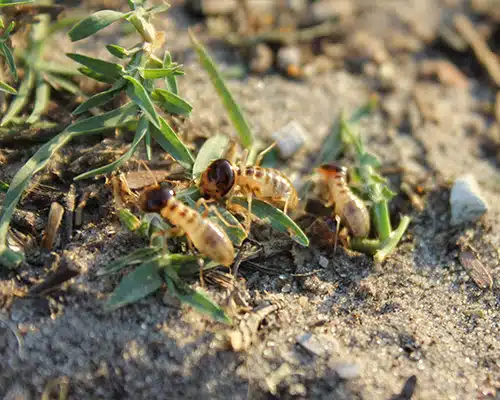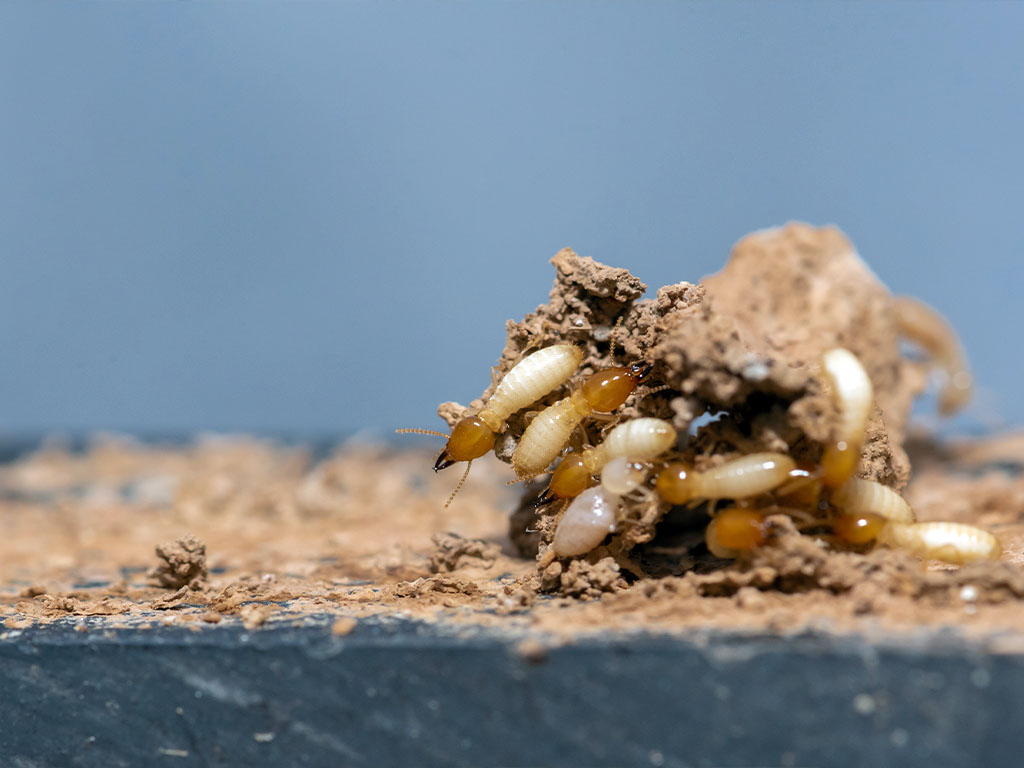Soil Poisoning
Get Free Quote
What is Soil Poisoning
Soil poisoning, also known as soil treatment or soil sterilization, is a method used to eliminate pests and insects that live in the soil and pose a threat to buildings, crops, or gardens. In South Africa, soil poisoning is commonly employed to control termite populations before constructing new buildings, as termites can cause significant structural damage. The process involves applying chemical pesticides to the soil to create a barrier that kills or repels pests, preventing them from reaching the surface or infesting nearby structures.
In agricultural contexts, soil poisoning is also used to protect crops from soil-dwelling pests that can damage roots and hinder plant growth. By treating the soil, farmers can reduce pest populations and promote healthier crop development. However, it is crucial to use these chemicals responsibly to minimize environmental impact and prevent harm to beneficial soil organisms. In South Africa, professionals performing soil poisoning must adhere to local regulations and guidelines to ensure safe and effective pest control.
Why Does Soil Poisoning Matter?
Soil poisoning, also known as soil treatment or soil sterilization, is an essential step before beginning construction. One of the primary reasons it matters is to prevent termite infestations. Termites are known for their ability to cause extensive damage to wooden structures by eating away at the wood, often unnoticed until significant harm has been done. By treating the soil with termiticides before construction, you create a chemical barrier that helps protect the future building from these destructive pests. This proactive measure can save homeowners and builders from costly repairs and structural damage in the long run.
Another important reason for soil poisoning before construction is to ensure a stable and safe foundation. Certain pests and plant roots can undermine the stability of the soil, leading to shifting and settling issues over time. By eliminating these potential problems before construction begins, you ensure that the foundation remains solid and secure. This process helps in maintaining the structural integrity of the building, reducing the risk of cracks, uneven floors, and other issues that can arise from an unstable foundation.
Finally, soil poisoning helps create a healthier environment for future occupants. Untreated soil can harbor a variety of pests, including ants, rodents, and other insects that can infiltrate the building once it is constructed. These pests can carry diseases and create an unhealthy living environment. By treating the soil beforehand, you significantly reduce the risk of these pests entering the building, thereby promoting a safer and healthier space for occupants. This preventive step is an investment in the long-term well-being and safety of those who will live or work in the constructed building.

What is Secondary Soil Poisoning?
Secondary soil poisoning, also known as post-construction soil treatment, is a process of applying chemical treatments to the soil around an existing structure to prevent or manage pest infestations, particularly termites. This treatment is typically conducted after the initial construction and primary soil poisoning have been completed but can also be applied to buildings that did not receive pre-construction treatment. The goal of secondary soil poisoning is to create a chemical barrier in the soil that prevents termites and other pests from entering the structure and causing damage.
When is Secondary Soil Poisoning Needed?
Post-Construction Termite Infestations: Secondary soil poisoning is crucial when there is evidence of termite activity in or around an existing building. If termites are detected through regular inspections or visible signs of infestation, applying secondary soil treatment can help eradicate the pests and prevent further damage to the structure.
Preventive Measures for Older Buildings: Buildings that were constructed without pre-construction soil poisoning are at a higher risk of termite infestations. For these older structures, secondary soil poisoning acts as a preventive measure to protect against potential termite incursions. This is particularly important in areas known for high termite activity.
After Construction Alterations or Additions: When significant alterations or additions are made to an existing building, such as adding extensions or modifying foundations, the integrity of the original soil treatment may be compromised. In such cases, secondary soil poisoning ensures that the new or altered parts of the building are adequately protected against termites.
Secondary soil poisoning involves injecting termiticides into the soil around the perimeter of the building and sometimes into the foundation or crawl spaces. This creates a protective barrier that is essential for long-term pest management and structural integrity. By maintaining this barrier, property owners can safeguard their investments and ensure a pest-free environment.
Request A Free Quote
What are the steps to Pre-Construction Soil Poisoning

1. Site Preparation
- Clearing the Site: The construction site must be cleared of any debris, vegetation, and organic matter that could interfere with the treatment process.
- Excavation: The soil is excavated to the required depth for foundations, basements, and other underground structures. This is done before the application of termiticides.
2. Soil Treatment
- Application of Termiticides: Termiticides are applied to the soil in the excavated areas. This is typically done by spraying or injecting the chemicals into the soil at specified depths and rates.
- Uniform Coverage: Ensuring uniform coverage of the termiticide is crucial. This includes treating the entire surface area of the foundation, including trenches, around plumbing and utility lines, and under slabs.
3. Foundation Treatment
- Treatment of Trenches and Foundations: The sides and bottom of foundation trenches are treated with termiticides before the concrete is poured. This includes treatment of the soil beneath footings and slabs.
- Treatment of Backfill Soil: After pouring the concrete foundation, the soil used to backfill around the foundation walls is treated with termiticides to maintain the protective barrier.
4. Moisture Barrier
- Installation of Moisture Barrier: A moisture barrier, such as a polyethylene sheeting, is often placed over the treated soil before pouring concrete slabs. This helps in reducing moisture, which attracts termites, and enhances the effectiveness of the termiticide.
5. Ongoing Monitoring and Maintenance
- Regular Inspections: After the initial treatment, regular inspections are recommended to ensure that the termiticide barrier remains effective and to detect any signs of termite activity early.
- Reapplication if Necessary: Depending on the type of termiticide used and environmental conditions, reapplication of termiticides might be necessary to maintain an effective barrier over time.
6. Documentation and Compliance
- Record Keeping: Documenting the treatment process, including the type of termiticide used, application rates, and areas treated, is essential for future reference and compliance with building codes.
- Compliance with Regulations: Ensuring that all treatments comply with local building codes and regulations regarding termite control and pesticide use.
By following these steps, builders and property owners can significantly reduce the risk of termite infestations and protect the structural integrity of the building from the outset. Pre-construction soil poisoning is a critical investment in the longevity and durability of any new construction project.
Accend Solutions is Available 24/7 for Emergency Pest Control including Soil Poisoning in Gauteng and North-West Provinces in South Africa.
email: info@accend.co.za
call: 068 474 7303
FAQs on Pre-Construction and Post-Construction Soil Poisoning
We know you may have questions about Harvester Termites in general and how Pest Control for Harvester Termites work. We have compiled a few FAQs on Harvester Termites that might clear the confusion.
CLICK HERE FOR FAQs ON PRE-CONSTRUCTION AND POST-CONSTRUSTION SOIL POISONING
Q: What is pre-construction soil poisoning? A: Pre-construction soil poisoning, also known as pre-construction termite treatment, involves treating the soil with termiticides before construction begins to prevent termite infestations. This process creates a chemical barrier that deters termites from entering the structure, protecting it from potential damage.
Q: Why is pre-construction soil poisoning necessary in Johannesburg? A: Johannesburg, like many other regions, has a high incidence of termite activity due to its climate and soil conditions. Pre-construction soil poisoning is essential to safeguard buildings from termite infestations that can compromise structural integrity and require costly repairs.
Q: When should pre-construction soil poisoning be conducted in Johannesburg? A: Ideally, pre-construction soil poisoning should be performed during the early stages of site preparation, after the site has been cleared and excavated for foundations. This ensures that the termiticides can be applied effectively to the exposed soil before any structural elements are built.
Q: What are the steps involved in pre-construction soil poisoning in Johannesburg? A: The steps typically include:
- Site preparation, including clearing and excavating the site.
- Application of termiticides to the soil in trenches, around plumbing, and under slabs.
- Treatment of foundation trenches and backfill soil before concrete is poured.
- Installation of a moisture barrier over treated soil to enhance effectiveness.
Q: Is pre-construction soil poisoning safe for the environment and residents of Johannesburg? A: Yes, reputable pest control companies use termiticides that are approved for use and follow strict application guidelines to minimize environmental impact and ensure safety for residents. It’s essential to choose certified professionals who adhere to environmental regulations.
Q: What is post-construction soil poisoning? A: Post-construction soil poisoning, or secondary soil treatment, involves applying termiticides around existing structures to prevent termite infestations after construction is complete. This is necessary when buildings were not originally treated or when there is evidence of termite activity.
Q: Why is post-construction soil poisoning important in Johannesburg? A: In Johannesburg, where termite activity is prevalent, post-construction soil poisoning helps manage and prevent termite infestations in older buildings or those that were not treated during construction. It protects structures from potential termite damage.
Q: How does post-construction soil poisoning differ from pre-construction treatment? A: Post-construction soil poisoning is applied to existing structures and focuses on creating a protective barrier around the foundation and other vulnerable areas. It may involve drilling into concrete or injecting termiticides into the soil around the building.
Q: What are the benefits of post-construction soil poisoning in Johannesburg? A: Benefits include:
- Preventing termite infestations in older buildings.
- Protecting structures from potential termite damage.
- Extending the lifespan and integrity of the building.
- Providing peace of mind to property owners against future pest problems.
Q: How often should post-construction soil poisoning be performed in Johannesburg? A: The frequency of post-construction soil poisoning depends on factors such as the type of termiticide used, local termite pressure, and environmental conditions. Regular inspections and maintenance may be recommended to ensure ongoing protection.
These FAQs provide comprehensive information on both pre-construction and post-construction soil poisoning practices in Johannesburg, addressing common concerns and considerations for property owners and builders. For specific advice and services, consulting with a professional pest control provider like Accend Solutions is advisable.
Call For Free Quotes
We do more than Soil Posioning
Available In All of Gauteng
Always at your service, wherever you are!
- Midrand
- Merose Arch
- Mellville
- Muldersdrift
- Paulshof
- Parktown
- Randburg
- Roodepoort
- Sandton
